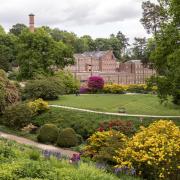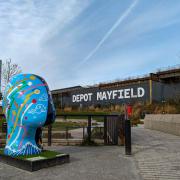Diversification in difficult places

Wales. Land of my fathers. In my case, this is quite literally true! One of my most interesting holidays was spent being a shepherdess during a very cold Easter week on the hills of Denbighshire. Even now, more years on than I wish to count, I still remember how hard it was and (more still) how intensely rewarding. I look back on that week with fondness, peering through my bi-focal rose-coloured spectacles. Sitting in our Chester Land Management team, and following all the trials and tribulations that farmers endure now, I cannot imagine how much tougher it must be for the hard-working, ever-enduring Welsh hill farmer.
As both lamb and beef prices fluctuate, and costs of everything from feed to insurance seems to spiral ever upwards, how much longer will the ever-present sheep and Welsh Black cattle be the mainstay of the Welsh farmers’ income?
Diversification is the buzz word. This can be easier said than done… When you visit the glorious countryside of North Wales, resplendent with hills, mountains, rivers and lakes, there is no reason why the complications of actually living there would cross your mind. Things that you might take for granted – everything from water supply to electricity (it was not until 2008 that the last village in Wales joined the National Grid), to the more modern day issues such as phone signal and broadband cabling – do not happen easily when there are large hills and mountains, made of some very old and very hard volcanic rock, stand in the way of “progress and infrastructure”!

In most instances, this will mean getting involved in the daunting world of Planning. I will admit that it is a subject that I generally find confusing and frankly formidable. But whilst chatting to our Planning Team to get an overview, I discovered that Wales is actually pretty progressive: they are very keen on sustainable diversification, and underpinning this mindset is the recent Environment (Wales) Bill, the Well-Being of Future Generations (Wales) Act 2015, and a newly appointed Future Generations Commissioner now in situ. Included in this latter Act are seven well-being goals, which show the direction that the Welsh Government has in mind.
How does this relate to diversification of underused outbuildings - or land - on a hill-farm, and bring in a better income either by changing what the farmer does, or what assets they have?
My own personal understanding is a whole lot clearer having chatted with our Planning Team. Any building conversion needs to be able to bring economic, cultural and sustainable benefits to both the building and its owners – both current and future. There is now so much technology available to help tick these boxes: Biomass boilers or ground source heat pumps, solar panels and thermal stores, rainwater harvesting (Wales is built for it!) and bio-digesters to name but a few. I’ve found it fascinating how many “old fashioned” materials are now used in the fabric of building conversions: sheep wool, hemp, flax, plaster mixes using lime, clay render, cork, and wood fibre – some of which can be recycled/composted or used as a heat source at their end of life. The sheer array of possibilities for conversion and building fabric is inspiring. I got utterly sidetracked during my research – and am in awe of the way that old materials are combined with new techniques and knowledge to combine modernity and a wonderful nod to history – of the area, the culture and of the buildings.

Government papers say that the type of land you farm will influence what sort of development is allowed. There is an Agricultural Land Classification system used to assess the agricultural quality of land, and Environmental Impact Assessments to look at the potential impact of any development on your land. It is also advisable to look at the priorities that local communities have set out in their Parish or Community plan: this would help you know which Planning Permissions might be successful.
In a 2015 survey, tourism topped a farm diversification profit league in Wales as farmers searched for alternative sources of income. The most common option was letting buildings out for non-farming use (for which you would need planning permission too), followed by farms offering tourist accommodation and catering or holding a festival, those offering recreation and sporting activities, and finally those processing and selling their own produce. There is also agricultural diversification – instead of food crops, there is a market for pharmaceutical or energy crops. The Deputy Minister for Farming and Food said at the time of the survey that “The right diversification project can make all the difference to some farm businesses – releasing unused resources of land and buildings, increasing revenue and security and making them more adaptable to changing conditions in the industry. The range in type and scale of possible diversification is extensive.” Local and successful diversification not only brings benefit to the owner, but also to the local rural economy through successful community integration.
The Government recommends that you seek independent advice if you are wondering whether or not to diversify – and if diversification is actually the right thing to do for your farm. And who are we to argue with such sage advice?
If you are looking out over your fields, with sheep grazing your hillside, then you might already have prime hogget on the table, cheese in the larder, “cold manure” in your garden (amazing what research teaches you!), wool in your jumper and in your loft….and be enjoying sustainable living at its most, well, sustainable. Mae’n bywyd da!
Strutt & Parker, 37 Lower Bridge Street, Chester CH1 1RS 01244 354888



























![Stephen Webb [Frank-N-Furter], Richard Meek [Brad], Haley Flaherty [Janet] & cast](/resources/images/128x89/1x/17679473.jpg)
![Stephen Webb [Frank-N-Furter], Richard Meek [Brad], Haley Flaherty [Janet] & cast](/resources/images/180x180/1x/17679473.jpg)
